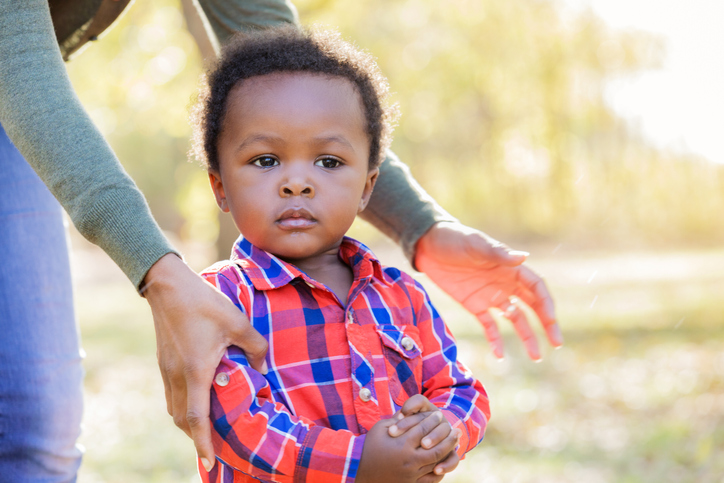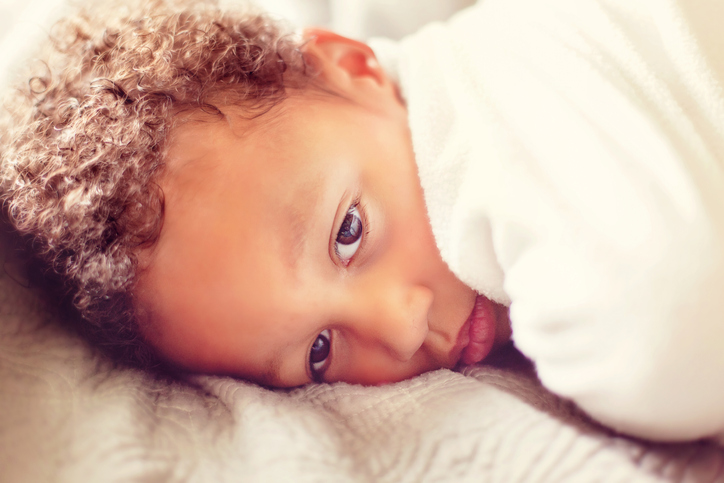
Source: asiseeit / Getty
Any parent of an infant or toddler knows that clear communication can sometimes be a battle as children learn to identify and name their feelings. For example, I’m currently helping my four-year-old understand that every “tummy rumble” doesn’t means she’s hungry. She’s also learning how to “use her words” instead of whining which can be a tedious process for both parent and child. I often have to remind myself that she’s only been on this earth for four years. As much as I joke that Black parents are quick to dismiss the stress and mental health struggles of anyone under a certain age that isn’t paying bills or having back problems, the truth is life is difficult. Your toddler’s frustrations and worries about life’s challenges feel just as real as any adult’s. They get tired, hungry, cranky, and scared just like we do. I would even argue they have an even tougher time because they have yet to experience many situations that allow them to overcome barriers and build confidence.
What also makes it harder for children to express feelings, is your reaction as parent. Simply understanding child development doesn’t mean you won’t be annoyed when your child is asking for the third cup of water to avoid bedtime or spills an entire half gallon of OJ because she insisted ” I can do it myself.” What doesn’t help the situation is yelling, minimizing your child’s feelings, or failing to provide tools to help them problem solve. Don’t get me wrong, I know my mom has nothing but unconditional love for me, but I’d be lying if I said I don’t have a collection of memories from my own childhood that involve being shamed or criticized every time something didn’t go precisely according to plan.
Even as a parent now, there are times my four year old has fallen off a couch after using my living room as a trampoline park. I may have warned her 10 times before to stop before she hurts herself and when she finally does my first instinct is to yell. It’s not actually because I am angry at her, but more because I’m scared, but I quickly recognize that all my anxiety does is add to her frustration. I’ve now recognized that I don’t want to parent according to the philosophy of lash out first, love later. Children get sick, fail classes, spill things, lie and in general are far from perfect and that isn’t always something that requires fault, blame or an irrational outburst.
The more we become aware as a community of how common mental health struggles can be, the more we begin to normalize and name conditions like anxiety and become familiar with what are own triggers are. Anxiety is characterized by feelings of fear, worry or nervousness and not only are those feelings normal but they are necessary for survival. Anxiety is characterized as a disorder when those feelings are excessive, irrational or prevent someone from carrying out their daily activities in a healthy way. According to the Anxiety and Depression Association of America, anxiety disorders are the most common mental illness in the U.S., affecting 40 million adults in the United States, age 18 and older, or 18.1% of the population every year.
Being hyper-aware that anxiety disorders are real can sometimes result in parents over-diagnosing children for common challenges in development or ignoring their concerns all together. Every experience with anxiety doesn’t automatically signal a disorder. With toddlers, anxiety can be even more challenging because they are often unable to articulate their feelings. It’s a parent’s responsibility to help children interpret, label and navigate uncomfortable feelings and situations so that they don’t grow dependent on unhealthy coping skills. Here are a few ways your child might be trying to tell you they are nervous, scared or worried:

Source: sarahwolfephotography / Getty
Tummy trouble or other random illnesses or pain
We’re all familiar with the feeling of our stomach doing a somersault before public speaking, a first date or even a intimidating medical procedure. Just like us, kids can experience anxiety when encountering new experiences and people, or familiar situations that they have caused discomfort in the past. Your child may not tell you outright that they’re scared of the dark or meeting new children on the first day or preschool. They’ll simply tell you, “My stomach hurts.” What’s important is to not dismiss their feelings as attention-seeking or assume they ate too many cookies. Anxiety really can result in feelings of nausea or upset stomach because the stomach houses the enteric nervous system, often called the body’s second brain. Nervousness and fear is enough to trigger those nerves and literally cause a stomachache. Put down the Pepto and the natural instinct to tell your child there is nothing to be afraid of. Instead help them identify what exactly is causing their anxiety and then explore ways to overcome it.









